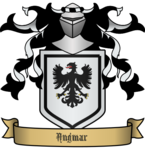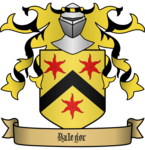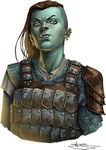Difference between revisions of "Umberland"
(→Politics and Turmoil) |
(→Rebelion) |
||
| (5 intermediate revisions by the same user not shown) | |||
| Line 1: | Line 1: | ||
[[File:FlagOfUmberland.png|thumb|200px|Flag of Umberland]] | [[File:FlagOfUmberland.png|thumb|200px|Flag of Umberland]] | ||
| + | |||
| + | == Description == | ||
Kingdom of Umberland is an Arcadian feudal monarchy which lies North of Fynwell and East of Argyle. While vast, it is mostly agrarian and contains few major cities. This is in part attributed to it's rigid, uncompromising feudal system and conservative culture. | Kingdom of Umberland is an Arcadian feudal monarchy which lies North of Fynwell and East of Argyle. While vast, it is mostly agrarian and contains few major cities. This is in part attributed to it's rigid, uncompromising feudal system and conservative culture. | ||
| Line 23: | Line 25: | ||
Angmar is considered to be a an extremely good statesman and politician, always able to get an upper hand when negotiating with foreign powers, while at the same time keeping his quarreling underlings in check. He has an uncanny ability to know which of his vassals can be trusted, which can be bought and which must be made to obey him by application of leverage of force. He rules against all odds, and while many disagree with his strong arm politics, none dare to openly oppose him. | Angmar is considered to be a an extremely good statesman and politician, always able to get an upper hand when negotiating with foreign powers, while at the same time keeping his quarreling underlings in check. He has an uncanny ability to know which of his vassals can be trusted, which can be bought and which must be made to obey him by application of leverage of force. He rules against all odds, and while many disagree with his strong arm politics, none dare to openly oppose him. | ||
| − | <gallery> | + | <gallery widths="150px" heights="150px"> |
File: Umberland-OldKingAgmar.jpg | Old King Angmar | File: Umberland-OldKingAgmar.jpg | Old King Angmar | ||
File: Umberland-PrinceRoderic.jpg | Crown Prince Roderic | File: Umberland-PrinceRoderic.jpg | Crown Prince Roderic | ||
| Line 45: | Line 47: | ||
Agatha is one of the very few Umberland women to hold the title of the Lord, and this is mostly due to a combination of her father's tragic death and her refusal to marry. Her father, Lord Vernon, slipped and fell off the highest tower in the castle to his death. Agatha, the only witness mourned her father, but did not stop the servants serfs and vassals from celebrating, because the old lord was abusive and cruel. Under her rule, the province flourished and she has opened new trade routes to the west and south. She has supporters in the neighboring western provinces that also border Argyle and is said that she has secured Queen Gertrude's favor and friendship. Agatha and her supporters are likely to secede from Umberland as soon as Old King dies. | Agatha is one of the very few Umberland women to hold the title of the Lord, and this is mostly due to a combination of her father's tragic death and her refusal to marry. Her father, Lord Vernon, slipped and fell off the highest tower in the castle to his death. Agatha, the only witness mourned her father, but did not stop the servants serfs and vassals from celebrating, because the old lord was abusive and cruel. Under her rule, the province flourished and she has opened new trade routes to the west and south. She has supporters in the neighboring western provinces that also border Argyle and is said that she has secured Queen Gertrude's favor and friendship. Agatha and her supporters are likely to secede from Umberland as soon as Old King dies. | ||
| − | <gallery> | + | <gallery widths="150px" heights="150px"> |
File: Umberland-LadyAgatha.jpg | Lady Agatha Vernon | File: Umberland-LadyAgatha.jpg | Lady Agatha Vernon | ||
File: CoatOfVernon.png | House Vernon | File: CoatOfVernon.png | House Vernon | ||
| Line 58: | Line 60: | ||
== Rebelion == | == Rebelion == | ||
| − | While western, southern and central regions of Umberland are relatively orderly, it's eastern reaches are in turmoil due to a protracted peasant revolt | + | While western, southern and central regions of Umberland are relatively orderly, it's eastern reaches are in turmoil due to a protracted peasant revolt. |
| − | The | + | The eastern provinces of the country have been traditionally less developed, and have fewer arable land and worse quality soil. Since most of the Umberland economy revolves around agriculture, the east has been poor and prone to famines and disease. Eastern lords are famous for ruthlessness and cruelty towards their serfs. Umberland society is also famously intolerant towards non-humans and humans of different races (such as Deep Folk, Verandans, Zoranderans and etc..). |
| − | <gallery> | + | The endemic poverty combined with class and racial tensions have lead to an open rebellion lead to an open rebellion lead by young Half Orc woman who goes simply by the name of [[Mika]] (and refuses to use any titles or honorifics). Her mother was an escaped serf, who made her way to Fynwell and managed to get her child enrolled at the University of Fynwell. Mika was an exceptional student and finished her education with high marks. Her favored area of interest was philosophy political theory, though she was also fascinated by history and military tactics and strategies. |
| + | |||
| + | <gallery widths="150px" heights="150px"> | ||
File:Umberland-RebelMika.jpg | Mika | File:Umberland-RebelMika.jpg | Mika | ||
File:FlagOfRepublic.png | Flag of the Republic | File:FlagOfRepublic.png | Flag of the Republic | ||
</gallery> | </gallery> | ||
| − | During her education Mika lived in [[Dog Fenn]] and became just as disillusioned with Fynwell brand of hierarchical capitalist democracy, as she was with the conservative feudalism of her homeland. | + | During her education Mika lived in [[Dog Fenn]] and became just as disillusioned with Fynwell brand of hierarchical capitalist democracy, as she was with the conservative feudalism of her homeland. A series of essays she wrote became infamous for their iconoclastic philosophy and biting critique of hierarchical governments and social inequality and strife they engender. They've been widely disregarded in Fynwell academic circles but also quite popular among Fynwell anarchists, rabble rouses and populist demagogues. Senator Trisha Dawnberry, member of White Hand faction once read one of them to the House of Commons creating such an uproar that the proceedings had to be adjured for the day. Later he was forced to apologize for reading such anti-government work and the text of the essay was stricken from the records. |
| − | Afterwards Mika has decided to return to her homeland and put her education to use in a fight for the rights of the common people. Her criticism of the horrors of feudalism as well as Umberland's entrenched racism and patriarchal tendencies have captured hearts and minds of thousands of commoners, especially women and minorities. Her movement grew to the point it became a formidable force and became an open armed rebellion that toppled two eastern provinces. | + | Mika's essays soon became such a politically charged issue that many aristocrats withdrew their funding for the university. Consequently she was barred from taking her final exams and receiving her degree and later banned from entering the campus or using university libraries. |
| + | |||
| + | Afterwards Mika has decided to leave Fynwell and return to her homeland and put her education to use in a fight for the rights of the common people. Her criticism of the horrors of feudalism as well as Umberland's entrenched racism and patriarchal tendencies have captured hearts and minds of thousands of commoners, especially women and minorities. Her movement grew to the point it became a formidable force and became an open armed rebellion that toppled two eastern provinces. | ||
Mika has proved to be an exceptional leader, and a surprisingly adept tactician. She armed the rebels, organized them into a fighting force and lead them to many victories. She bravely lead from the front ranks and never shied away from a challenge becoming a legend among her followers. Under her leadership the rebels have beheaded the local lords, captured their castles and freed their serfs, establishing what is known as People's Republic of Umberland. | Mika has proved to be an exceptional leader, and a surprisingly adept tactician. She armed the rebels, organized them into a fighting force and lead them to many victories. She bravely lead from the front ranks and never shied away from a challenge becoming a legend among her followers. Under her leadership the rebels have beheaded the local lords, captured their castles and freed their serfs, establishing what is known as People's Republic of Umberland. | ||
| Line 75: | Line 81: | ||
The Republic is not yet officially recognized by any of Arcadia nations. It is surrounded by enemies, and besieged by eastern nobility who seeks to quash the rebellion and recapture it's lands. That said the western nobles are too preoccupied with royal succession, potential usurpation of the throne by Lord Graymane and the separatist factions in the West and South to bother sending reinforcements to the east. Meanwhile the Republic's armies grow every day. | The Republic is not yet officially recognized by any of Arcadia nations. It is surrounded by enemies, and besieged by eastern nobility who seeks to quash the rebellion and recapture it's lands. That said the western nobles are too preoccupied with royal succession, potential usurpation of the throne by Lord Graymane and the separatist factions in the West and South to bother sending reinforcements to the east. Meanwhile the Republic's armies grow every day. | ||
| − | The republic is open to anyone: any serf, slave, commoner or noble born aristocrat can join the rebellion on equal footing and enjoy same freedoms regardless of sex, race or birth circumstances. | + | The republic is open to anyone: any serf, slave, commoner or noble born aristocrat can join the rebellion on equal footing and enjoy same freedoms regardless of sex, race or birth circumstances. The government of the republic is still in flux, but it is actively discussed and modeled vaguely on Verandan direct democracy principles, but with focus on abolishing class, race and gender divisions and Mika's own revolutionary socialist theories. |
| + | |||
| + | [[Category: Nation]] | ||
Latest revision as of 17:30, 1 August 2017
Description
Kingdom of Umberland is an Arcadian feudal monarchy which lies North of Fynwell and East of Argyle. While vast, it is mostly agrarian and contains few major cities. This is in part attributed to it's rigid, uncompromising feudal system and conservative culture.
The kingdom is allied with both of it's prominent neighbors: Argyle and Fynwell and maintains trade relationships with most major nations. It's rulers, for the most part have been uninterested in any kind of expansionism but are known for fiercely defending their lands. Umberland is famed for it's heavy cavalry, and heavy infantry and it is said their forts and castles are near impervious to siege.
Demographics and Culture
Umberland is an agrarian feudal society. It has very few cities, and virtually nonexistent population of free people but an unusually large knightly caste. Majority of the population are commoners who are are serfs bound to the land and forced into servitude of the local noble born land owner. Roughly 60% are human, 30% are half orcs and the rest is mostly dwarfs, with extremely few elves gnomes or halflings who are seen as inferior labor force.
The aristocratic caste is entirely composed of humans, and the strict rules of succession and lineage prevent commoners, foreigners and non-humans from ascending to a higher social status. Only noble born men are allowed to bear arms in defense of the kingdom, which results in unusually large knighly caste, and extremely complex and stratified system of feudal obligations.
The Umberland culture is mostly considered backwards, regressive and overly traditionalist by most of Arcadian nations. It is not a pleasant land to visit, unless you happen to be a guest of one of the nobles. Travelers are treated with mistrust, especially if they are foreign, speak with an accent or look different from the locals. Many landowners are leery of trespassers and detain travelers for questioning or collect tariffs for traveling through their lands. It is considered proper etiquette to ask a landlord for permission via letter before entering their lands.
All forests belong to the lords and hunting on their grounds without permission is considered a major offense. Serfs need their lord's permission to leave their lands or marry a foreigner.
Umberland commoners are usually poor and downtrodden. They are usually pleasant people, but they live under strict rules enforced from above. Many will welcome travelers to their homes because tavens and inns are few and far between in the land. Most won't accept gold coins from foreigners fearing that receiving such amount of money will anger their landlord.
Politics and Turmoil
Umberland is ruled by Old King Angmar. In his youth he made a name of himself with his feats of strength and bravery and his imposing stature. Even in his old age he is a mountain of a man, still capable of wearing his ornate full plate armor and swinging his heavy mace which he likes to demonstrate during official functions.
Angmar is considered to be a an extremely good statesman and politician, always able to get an upper hand when negotiating with foreign powers, while at the same time keeping his quarreling underlings in check. He has an uncanny ability to know which of his vassals can be trusted, which can be bought and which must be made to obey him by application of leverage of force. He rules against all odds, and while many disagree with his strong arm politics, none dare to openly oppose him.
While blessed with impressive health, fortitude and longevity, the king has never able to sire an heir. Despite three marriages, and countless royal concubines, and much gold spent on medics and mystic cures, he remains childless. To preserve the dynasty Angmar has adopted two sons - something that is frowned upon by the Umberland nobility. His first adopted heir Cedric was assassinated by infamous Namfoodle Fizzlebang but it is not known who has funded it. It is widely suspected it was paid for Lord Graymane who is next in the line of succession.
His second adopted son Prince Roderic is a shy, quiet, withdrawn man who possesses neither the strength nor character of his father, and is quite unpopular among the Umberland nobility. When the Old King dies, it is unlikely he will be able to keep the kingdom from fracturing.
Lord Graymane has, on many occasions criticized adoption as improper and illegitimate way to secure succession as per Umberland traditions. Agmar himself has stripped lordship from bastards and adopted sons at multiple occasions to resolve local disputes. Thus it is widely suspected that Graymane and his supporters will either force young prince to peacefully step down, or usurp the throne by force.
Separatists
The potential succession trouble is not the only problem Prince Roderic may face in the future. There are two separatist factions among the Umberland nobility who remain loyal to Agmar but have no love for neither the young prince nor Lord Graymane.
The first of these factions is known as Firstborn Daughters and lead by Lady Agatha. It consists of number of daughters of Umberland lords frustrated by the fact that the succession rules of the nation favor male heirs. Should they swear the allegiance to Argyle and join the Pride they would be recognized as rightful heirs or heads of their households, rather than being skipped in favor of younger siblings, or their less deserving husbands.
Agatha is one of the very few Umberland women to hold the title of the Lord, and this is mostly due to a combination of her father's tragic death and her refusal to marry. Her father, Lord Vernon, slipped and fell off the highest tower in the castle to his death. Agatha, the only witness mourned her father, but did not stop the servants serfs and vassals from celebrating, because the old lord was abusive and cruel. Under her rule, the province flourished and she has opened new trade routes to the west and south. She has supporters in the neighboring western provinces that also border Argyle and is said that she has secured Queen Gertrude's favor and friendship. Agatha and her supporters are likely to secede from Umberland as soon as Old King dies.
The second separatist faction is lead by young Lord Bastian who has been educated in Fynwell and has grown to appreciate the city's culture and custom. He cuts his hair and neatly trims his beard after the fashion of Fynwell aristocrats, wears southern made clothing, and even affects Fynwell accent (except when he forgets) and mannerisms. He is enamored by the great city's democratic process. He is a good friend of Lord Gruzwell and has close ties to many members of the Cavalieer political faction. It is said that it would be his dream to establish his family as a new Great House of Fynwell.
His lands border the Flatside district and should Lord Graymane expansionist ambitions take him South they would provide an excellent buffer zone for the city and further weaken Umberland. So it is not unlikely that the Fynwell Senate would pass a resolution to induct Bastian as new Fynwell Lord, provided that senators could secure the vote of White Hand and Brass Lions.
Rebelion
While western, southern and central regions of Umberland are relatively orderly, it's eastern reaches are in turmoil due to a protracted peasant revolt.
The eastern provinces of the country have been traditionally less developed, and have fewer arable land and worse quality soil. Since most of the Umberland economy revolves around agriculture, the east has been poor and prone to famines and disease. Eastern lords are famous for ruthlessness and cruelty towards their serfs. Umberland society is also famously intolerant towards non-humans and humans of different races (such as Deep Folk, Verandans, Zoranderans and etc..).
The endemic poverty combined with class and racial tensions have lead to an open rebellion lead to an open rebellion lead by young Half Orc woman who goes simply by the name of Mika (and refuses to use any titles or honorifics). Her mother was an escaped serf, who made her way to Fynwell and managed to get her child enrolled at the University of Fynwell. Mika was an exceptional student and finished her education with high marks. Her favored area of interest was philosophy political theory, though she was also fascinated by history and military tactics and strategies.
During her education Mika lived in Dog Fenn and became just as disillusioned with Fynwell brand of hierarchical capitalist democracy, as she was with the conservative feudalism of her homeland. A series of essays she wrote became infamous for their iconoclastic philosophy and biting critique of hierarchical governments and social inequality and strife they engender. They've been widely disregarded in Fynwell academic circles but also quite popular among Fynwell anarchists, rabble rouses and populist demagogues. Senator Trisha Dawnberry, member of White Hand faction once read one of them to the House of Commons creating such an uproar that the proceedings had to be adjured for the day. Later he was forced to apologize for reading such anti-government work and the text of the essay was stricken from the records.
Mika's essays soon became such a politically charged issue that many aristocrats withdrew their funding for the university. Consequently she was barred from taking her final exams and receiving her degree and later banned from entering the campus or using university libraries.
Afterwards Mika has decided to leave Fynwell and return to her homeland and put her education to use in a fight for the rights of the common people. Her criticism of the horrors of feudalism as well as Umberland's entrenched racism and patriarchal tendencies have captured hearts and minds of thousands of commoners, especially women and minorities. Her movement grew to the point it became a formidable force and became an open armed rebellion that toppled two eastern provinces.
Mika has proved to be an exceptional leader, and a surprisingly adept tactician. She armed the rebels, organized them into a fighting force and lead them to many victories. She bravely lead from the front ranks and never shied away from a challenge becoming a legend among her followers. Under her leadership the rebels have beheaded the local lords, captured their castles and freed their serfs, establishing what is known as People's Republic of Umberland.
The Republic is not yet officially recognized by any of Arcadia nations. It is surrounded by enemies, and besieged by eastern nobility who seeks to quash the rebellion and recapture it's lands. That said the western nobles are too preoccupied with royal succession, potential usurpation of the throne by Lord Graymane and the separatist factions in the West and South to bother sending reinforcements to the east. Meanwhile the Republic's armies grow every day.
The republic is open to anyone: any serf, slave, commoner or noble born aristocrat can join the rebellion on equal footing and enjoy same freedoms regardless of sex, race or birth circumstances. The government of the republic is still in flux, but it is actively discussed and modeled vaguely on Verandan direct democracy principles, but with focus on abolishing class, race and gender divisions and Mika's own revolutionary socialist theories.











